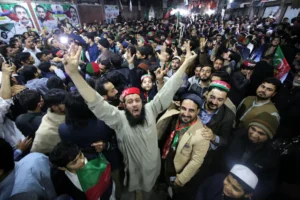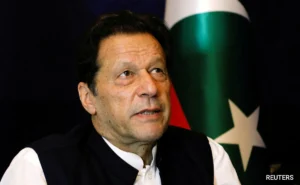Fears grew early Friday (9th February) that Pakistan’s general election might spark further political chaos, amid charges of vote manipulation and early indications that the party of imprisoned opposition leader Imran Khan may have fared better than predicted.
Khan’s opponent, three-time Prime Minister Nawaz Sharif, was largely seen as the obvious front-runner and chosen choice of Pakistan’s strong military. However, unofficial early results cited by local media showed that Sharif’s party may fail to secure a parliamentary majority and struggle to create a new government.

Eight hours after the polls closed, none of the 265 contests had been officially called. Regardless, Khan’s party, Pakistan Tehreek-e-Insaf, or PTI, claimed early Friday that it was on track for victory. The party accused electoral officials of purposefully delaying vote counting, which appeared to slow down overnight. “We demand that the returning officers do not manipulate the results,” stated Omar Ayub Khan, the PTI Secretary General.
The PTI’s declaration of victory may indicate further chaos. Early Friday morning, footage showed Khan supporters gathered outside polling stations. Many of them have long felt abused by Pakistani authorities, who have effectively dissolved Khan’s party and detained many of its officials.
What’s at on the line?
The previous two years have been volatile in Pakistan, and the country’s elite had anticipated that the election would restore stability and tranquilly.
Khan’s removal as prime minister in April 2022 sparked months of increasing tensions with the military, which he blames for his political demise. Pakistan has a history of arresting and imprisoning previous leaders who oppose the military, but efforts to arrest Khan on corruption accusations early last year proved very difficult, resulting in riots between security personnel and his followers.

The Pakistani government contrasted the subsequent protests, which officials claim also targeted military institutions, to the Jan. 6, 2021, attack on the United States Capitol by Donald Trump supporters.
Khan’s party has denied the similarities, claiming that the majority of its followers demonstrated peacefully. However, the PTI has warned that it may be unable to manage its followers’ rage if what they see as an electoral success is taken away from them.
Suspension of mobile-services
Pakistani authorities have regularly resorted to targeted or large-scale mobile service suspensions in recent years, and officials used security concerns to justify Thursday’s statewide closure of all mobile internet and mobile connections.
According to Pakistan’s military, 12 people were murdered in 51 incidents “aimed at disrupting the electoral process” despite these measures.
Possible challenges for the upcoming Prime Minister of Pakistan
Aside from dealing with significant political polarisation and a strengthened military, Pakistan’s next prime minister will have serious economic challenges.
Abid Qaiyum Suleri, a Pakistani economist, predicted difficult decisions ahead. There would most certainly be pressure on Pakistan’s future leader to support popular but “economically unwise decisions to provide immediate relief to the people,” Suleri said.
While Pakistan relies on outside assistance to keep its economy going and cannot afford further government spending, he believes the next administration will be persuaded to continue food and petrol subsidies in order to maintain social stability. It may hinder future discussions with international organisations over debt reduction.










